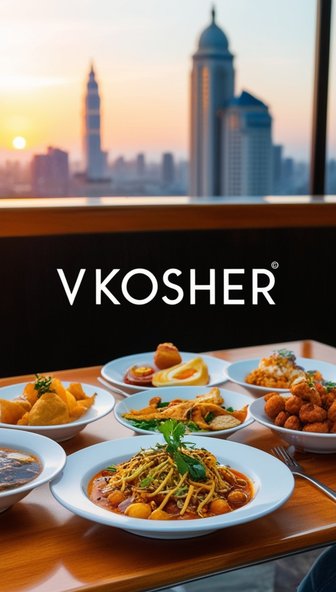Understanding Kosher Food Packaging
Kosher food packaging is an essential aspect of the global food industry, particularly for those adhering to Jewish dietary laws. These laws, known as kashrut, dictate not only what foods can be consumed but also how they are prepared, processed, and packaged. The demand for kosher food has grown significantly over the years, driven by religious observance as well as consumers seeking high-quality and ethically produced products. Consequently, kosher certification and packaging play a critical role in ensuring that food products meet these strict standards.
The Importance of Kosher Certification
Kosher certification is the process by which a food product is verified to comply with Jewish dietary laws. This certification is essential for producers who wish to market their products to kosher consumers. A kosher certification agency, typically an independent organization, inspects the food production process to ensure that all ingredients, production methods, and packaging adhere to kosher standards.
For a product to be considered kosher, it must meet specific criteria. These include the prohibition of certain animals, the requirement that meat and dairy products be prepared and consumed separately, and the inspection of fruits and vegetables to ensure they are free from insects. The certification process also involves the review of all equipment and facilities used in production to ensure they are free from contamination by non-kosher substances.
Once a product is certified, it is labeled with a kosher symbol, indicating to consumers that the product meets kosher standards. This symbol is an essential part of the packaging, as it allows consumers to easily identify kosher products.
Challenges in Kosher Food Packaging
Kosher food packaging presents unique challenges that go beyond those faced in general food packaging. One of the primary challenges is ensuring that the packaging itself is kosher. This involves verifying that all materials used in the packaging process, including adhesives, inks, and coatings, are free from non-kosher substances. Additionally, the packaging must be produced in a facility that adheres to kosher standards, with equipment that has not been contaminated by non-kosher materials.
Another challenge is the requirement for specific labeling on kosher products. The packaging must clearly display the kosher certification symbol, along with any additional information required by the certification agency. This can include details about the type of kosher certification (e.g., dairy, meat, or pareve), as well as information about the certifying agency. Accurate labeling is crucial, as any errors can lead to consumer mistrust and potential violations of kosher law.
Innovations in Kosher Packaging
In recent years, there have been significant innovations in kosher food packaging, driven by advances in technology and increased consumer demand for kosher products. One notable trend is the development of eco-friendly packaging solutions that comply with kosher standards. As consumers become more environmentally conscious, there is a growing demand for packaging that is both kosher and sustainable. This has led to the use of biodegradable materials, recyclable packaging, and reduced use of plastic in kosher food packaging.
Another innovation is the use of digital technologies to enhance the transparency and traceability of kosher products. Some companies are now using blockchain technology to track the entire production process, from the sourcing of ingredients to the final packaging. This ensures that every step of the process is documented and can be verified by consumers and certification agencies. Additionally, digital tools such as QR codes are being used on packaging to provide consumers with instant access to detailed information about the product's kosher certification and production process.
The Role of Packaging in Maintaining Kosher Integrity
The integrity of kosher food is paramount, and packaging plays a crucial role in maintaining this integrity. One of the primary functions of packaging is to protect the food from contamination by non-kosher substances. This is particularly important for products that are sensitive to environmental factors, such as moisture, light, and temperature. Proper packaging ensures that the food remains kosher from the time it is produced until it reaches the consumer.
Another important aspect of kosher packaging is the prevention of cross-contamination during transportation and storage. Kosher products must be stored separately from non-kosher products to avoid any risk of contamination. This requires careful planning and coordination, particularly in large distribution networks where kosher and non-kosher products may be handled by the same facilities. Packaging that is clearly labeled and securely sealed can help prevent accidental cross-contamination and ensure that kosher standards are maintained throughout the supply chain.
Consumer Trends and Kosher Packaging
As the demand for kosher products continues to grow, so too does the need for innovative and consumer-friendly packaging solutions. Today's consumers are increasingly looking for convenience, and this has led to the development of kosher products that are easy to prepare and consume. Packaging plays a key role in meeting these demands, with solutions such as microwaveable containers, resealable bags, and portion-controlled packaging becoming more common in the kosher market.
In addition to convenience, consumers are also seeking transparency in the products they purchase. They want to know not only that a product is kosher but also how it was produced and where it came from. Packaging that provides clear and detailed information about the kosher certification process, the sourcing of ingredients, and the production methods used can help build consumer trust and loyalty.
Regulatory Compliance in Kosher Packaging
Kosher food packaging must comply with a range of regulatory requirements, both in terms of kosher certification and general food safety standards. These regulations vary by country and can include requirements for labeling, packaging materials, and the handling of kosher products. It is essential for producers to stay up-to-date with these regulations to ensure that their products remain compliant and can be sold in different markets.
In the United States, for example, kosher certification agencies work closely with the Food and Drug Administration (FDA) to ensure that kosher products meet all relevant food safety standards. This includes regulations related to allergen labeling, nutrition information, and packaging materials. Similarly, in the European Union, kosher products must comply with the European Food Safety Authority's (EFSA) regulations, as well as any specific requirements set by kosher certification agencies.
Future Trends in Kosher Food Packaging
Looking ahead, the future of kosher food packaging is likely to be shaped by several key trends. One of these is the continued growth of the global kosher market, driven by increasing demand from both Jewish and non-Jewish consumers. As the market expands, there will be greater opportunities for innovation in packaging, particularly in areas such as sustainability, convenience, and digital integration.
Another trend is the growing importance of ethical and socially responsible practices in the food industry. Consumers are increasingly concerned about the environmental and social impact of the products they purchase, and this is driving demand for kosher products that are produced in a way that is both kosher and ethical. Packaging that reflects these values, such as using sustainable materials and supporting fair trade practices, will likely become more common in the kosher market.
Finally, advances in technology will continue to play a significant role in the evolution of kosher packaging. From blockchain for supply chain transparency to smart packaging that can monitor the freshness and quality of kosher products, technology will enable new levels of innovation and efficiency in kosher food packaging.
Conclusion
Kosher food packaging is a complex and evolving field, requiring careful attention to detail and a deep understanding of both kosher law and modern packaging technologies. As the demand for kosher products continues to grow, so too does the need for packaging solutions that meet the highest standards of quality, safety, and consumer satisfaction. Whether through innovations in sustainable packaging, the use of digital tools for transparency, or the development of new packaging formats that enhance convenience, the future of kosher food packaging is full of exciting possibilities.




